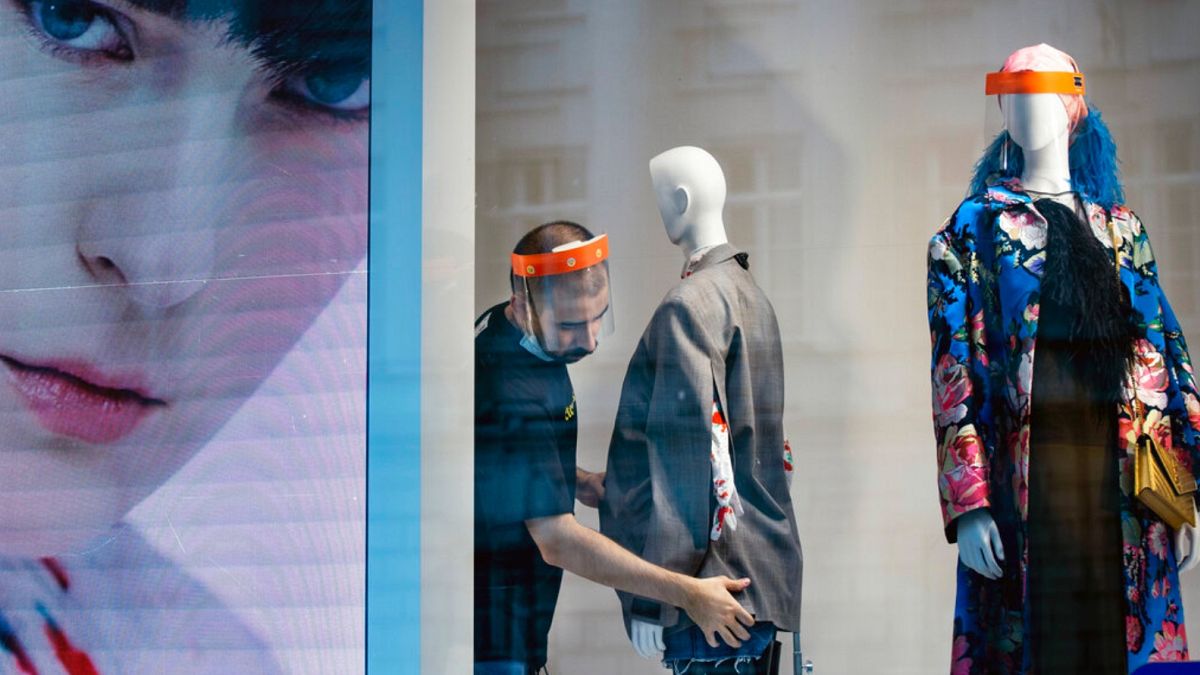Have you used lockdown to sift through your wardrobe and question your shopping habits? Well, the fashion industry has been doing some soul-searching, too.
Coronavirus lockdowns have left clothes stores with weeks of unsold goods on their hands and now is the time for the industry to rethink how it can become more sustainable, says the head of the British Fashion Council (BFC).
As confinement measures keep shoppers at home and stores shut, the global fashion industry has been hit hard by the COVID-19 pandemic – from suppliers to designers and retailers.
"As you’re sat at home and you’re not going out to events, to dinners restaurants, into work, the need for clothes – or really the opportunity to buy – just isn’t there," BFC chief executive Caroline Rush said in an interview on Euronews Now.
The sector is now facing what she called an "inventory crisis" that has left many with unwanted stock.
"The goods had been produced already, ready to go in-store before this lockdown came," she said.
This situation is posing a cash flow problem within the industry, Rush said.
But it also offers the sector a chance to rethink how it works – and how it could become more environmentally friendly.
"There is an incredible opportunity to try and consider how we are going to reset," Rush said.
Recycling and re-inventing
The fashion industry is responsible for 10 per cent of annual global carbon emissions, more than all international flights and maritime shipping combined, according to the United Nations Environment Programme.
The current model of "fast fashion" – a quick turnover of collections to pique consumers’ interest – is exacerbating that environmental cost, as the average person now buys 60 per cent more clothing than in 2000, but keeps each garment half as long, according to McKinsey.
With the coronavirus crisis, BFC's Rush said fashion designers should be compelled to consider recycling their excess stock of garments, "so that the product we have is re-used, shredded, goes back into new yarns and created for the future," she said.
"My optimism is, as we go through this, that we really think about the inventory challenge that we’re facing for this season, and use that as a unique opportunity to really think down the line: what will happen to that stock, where will it go?"
"Our industry (…) does have an impact on the planet – it brings a lot of joy to a lot of people, but there are definitely things that we could do better and now is the time to think about that."
London Fashion Week goes digital – and gender-neutral
Fashion weeks in Paris and Milan have been scrapped altogether due to coronavirus restrictions. The London Fashion Week, meanwhile, is changing its format – and going fully digital, at least while the pandemic continues to disrupt business.
The BFC, which organises the event, has unveiled plans to merge its women’s and men’s wear shows into one "gender-neutral" digital platform. It will run from June 12-14, when the London Fashion Week Men’s had been due to take place. The new online platform will be open to both traders and the general public, and will feature digital showrooms, interviews, podcasts and designer diaries.
Many designers actually won’t have a collection to showcase because their manufacturers are still closed or only starting to open. But Rush said for those that do have a product to offer, it felt important to showcase them, and make sure they reach international buyers.
“Of course we’re looking to China, who are coming through this, to look at how consumer behaviour is responding. During London Fashion Week, those that are selling their collections to a trade audience (…) will be for deliveries right at the end of this year or the beginning of next year. And you can imagine for retailers, trying to plan for what consumer behaviours are going to be like in six months’ time is an incredible challenge,” she said.
Rush said London Fashion Week would also offer the industry a welcome sense of "normality" and help it connect with global audiences in these difficult times.
"I think we’re all going to be ready for some inspiration and some creativity," she said.
